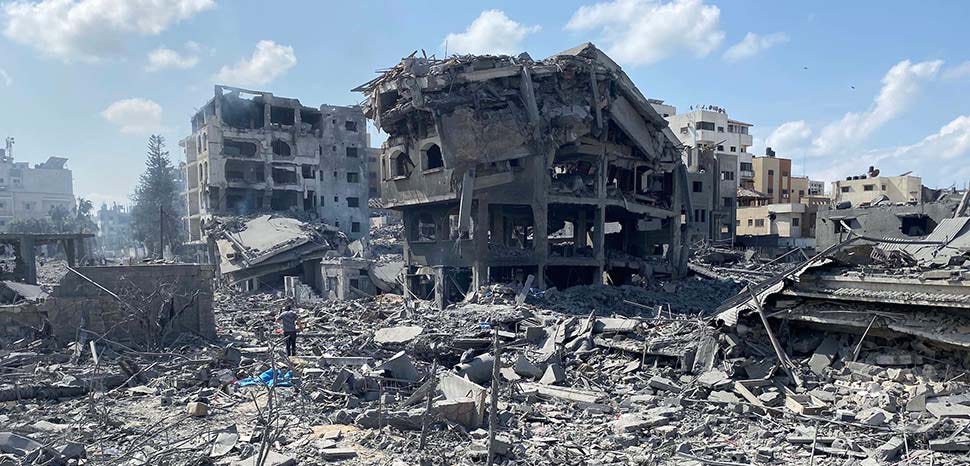Will Netanyahu Snatch Defeat from the Jaws of Victory?
Continued war will not make Israel safer. Indeed, the exact opposite will occur.
For those whose primary concern is Israeli long-term security, the killing of Hamas’ leader Yahya Sinwar ought to mark the end of Israel’s war in Gaza and related conflict against Hezbollah in Lebanon. With justice having been brought to the architect of the Oct. 7 massacre, Israel should quit Gaza in exchange for release of all the hostages and return of the remains of those who have perished. Israel has also completed much of its work clearing southern Lebanon of Hezbollah weaponry and personnel so that 70,000 Israeli’s may safely return to their homes. The capabilities of both Hamas and Hezbollah have been severely degraded, leading to large scale and long lasting improvements in Israel’s security posture. Israeli deterrence against these groups, as well as their Iranian sponsor, has been reestablished. All reasonable war aims have been achieved. Netanyahu should declare victory and start charting a post-war direction for Israel and its role in the region.
But alas, this is not the world that Bibi Netanyahu lives in.
He and his hyper-nationalist, religious fundamentalist allies in the current government dream about an unachievable “total victory” against their enemies. They believe that obliteration of groups that seek Israel’s destruction would open the doors to Israel exercising complete sovereignty over all the land between the Jordan River and the Mediterranean Sea, including the West Bank and Gaza, the biblical “Greater Israel.” Bibi’s allies see the killing of Sinwar and the decapitation of Hezbollah’s leadership as evidence that Israel is winning and therefore total victory will follow if Israel maintains and even accelerates its two-front war effort.
If Netanyahu follows this pathway, he will surely snatch a strategic defeat from the jaws of victory.
Continued war is a grave mistake because Sunni Arab states are still willing to join a strategic security partnership with Israel and the United States to counter Iran. As the two blunted missile attacks against Iran demonstrated, this strategic partnership would bring far more genuine security to Israel than further degradation of Hamas and Hezbollah.
But the Sunni Arab states will not form this coalition while Israel continues to pulverize Gaza into rubble, with civilians trapped in an unimaginable hellscape of violence, famine, disease and trauma. And while these potential future allies have been pleased to see Israel degrade Hezbollah, they will soon reach the limits of their tolerance for Israel’s destruction of Beirut, deep harm to Lebanese civilians, and destabilization of Lebanon’s already fragile state and society. The regional autocracies that desire a security partnership with Israel can withstand plenty of public opposition to a rapprochement with Israel, but they will not ignore public antipathy generated from continued daily media coverage of civilian suffering in Gaza and Lebanon. At some point, the stain from Israel’s actions may become so great as to make the security partnership impossible. The window is still open, but it may not be for much longer.
Pressing forward with war in Gaza and Lebanon will also deeply damage Israel’s long-term security by making these places ungovernable incubators of radicalism and extremism. The beliefs of Netanyahu’s right flank that violent resistance to the existence of a Jewish state can be snuffed out through warfare is pure fantasy. Indeed, history suggests the exact opposite. Prolonged warfare, excessive violence and oppression of civilians will only heighten and spread the grievances that fuel Israels’ enemies. These actions will create more extremists over the long haul, not fewer.
To be clear, I am not saying that Israel’s use of force against Hamas and Hezbollah has been unjustified. These groups had to be hit hard and their dangerousness had to be degraded. But at this stage the benefits Israel is gaining from continued use of force are being outweighed by the security costs Israel will be incurring for decades to come due to the impact the war is having on the broader population on both fronts, not to mention Palestinians in the West Bank.
The American experience in Iraq is instructive. When the insurgency arose in Iraq following the toppling of the Saddam Hussein regime, the U.S. tried for years to suppress it with violence, only to see the insurgency grow. It wasn’t until David Petraeus changed strategy by building support for the Iraqi government that the insurgency began to weaken. Everyday Iraqis could see that the Iraqi government provided some hope for the future while the insurgents promised nothing but continued violence.
Continued warfare in Gaza until every last Hamas fighter is killed or surrenders – which seems to be the current Israeli government’s policy – will only deepen the anti-Israel fervor in Gaza and guarantee a perpetual anti-Israel violent insurgency. An extended war in Lebanon will not extirpate Hezbollah from its firm position in Lebanese society, but it will further radicalize the population in southern Lebanon and weaken the already frail Lebanese state.
The maximalist goals of Israel’s far-right to militarily eliminate Israel’s enemies on its southern and northern borders are simply unachievable and would ultimately require Israeli governance extending all the way from the Litani River in Lebanon to the Rafah crossing with Egypt. Israel’s ineptitude in providing humanitarian assistance to Gaza’s civilians the past year has clearly demonstrated how incapable Israel is of handling such an enormous undertaking. Instead of these maximalist goals, Israel should see its mass degradation of Hamas and Hezbollah as victories and turn its attention to grappling with the post-war reality.
I fear that Netanyahu and Israeli society’s unwillingness to confront the stark and difficult challenges of this post-war era is what is driving the continuation of these wars. That is a deeply morally problematic reason to continue to engage in warfare that is leading to so much death and destruction. It is also likely to make Israel more vulnerable and less secure in years to come.



